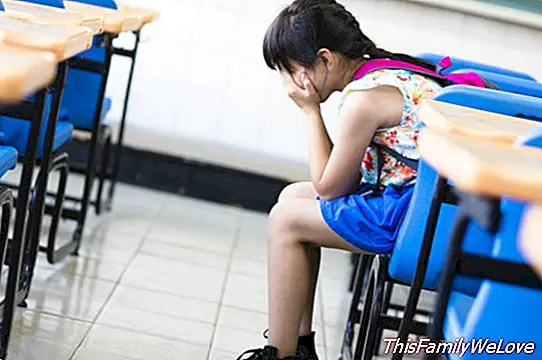Childish pessimism: how to form happy children

Both in the classrooms and in the consultations, it is increasingly common to find sad, disillusioned, "unmotivated" children, who, from the age of seven, say phrases like these: "Why am I going to try it? it goes very badly "," I do not serve at all "" often roll, this is very tired "... What are the causes of childish pessimism and how can we transform it into optimism and joy?
Traditionally, the second childhood has been a period of illusions, a moment of happiness, when the child discovers himself (self-concept) and realizes how many things he is capable of doing, thinking and feeling for himself (self-esteem). To experience that the effort is worthwhile, that a job that "costs" is more rewarding than "easy".
It is also the time to start a true socialization, relationships with other children and with adults outside of one's family become more frequent and stable, and the first real friendships begin to emerge. However, it is becoming increasingly frequent that this is changing.
Causes of childhood pessimism
The tendency of some children to pessimism, low self-esteem, little eagerness to overcome, low tolerance to frustration, lack of social skills, are often motivated by several factors:
1. Pessimism can have a physical origin: Poor nutrition, lack of sleep, sensory deficiencies, illnesses are important reasons for pessimism.
2. There may be some psychological factors that lead the child to this state (certain character traits, maladjustments or psychological alterations ...).
3. Affective deficiencies in the home They can come to make a deep dent in the character of a boy of this age.
4. Pessimism can have a social origin: The current hedonistic culture that only values immediate pleasure, materialism, individualism, incessant competitiveness can mark a personality that has yet to be developed.
5. Pessimism can have a family origin: more specifically in the educational style of the parents, in the rhythm of life that we impose on children from very young (excess of activities, of very high expectations, little time in the open air, solitude ...)
Tips for forming joyful children
1. Analyze if the feeding and the hours of sleep They are the right ones so that you can develop all your daily activities with energy and enthusiasm.
2. Maybe it's time to re-analyze the educational guidelines that we continue at home regarding tolerance, authority, love, ...
3. Think about how is the time we dedicate to our son, if we know how to have fun with him, without forgetting that every circumstance of life is an educational opportunity, that he has to lead us to be and help them to be better people.
4. Rate if you know your child in depth: what he likes, what fun, what desires and aspirations he has, what he is capable of doing. And let us know for them. Mutual knowledge and mutual activities will be rewarding for both, will improve communication and create the right climate for the real requirement.
5. Review the schedule of activities of your child and consider yourself if all of them are necessary and truly formative. Excess activity, in any person but especially in children, is a safe source of stress.
6. Do activities that allow you to have fun be in contact with others, overcome small difficulties, contact with nature, ... for example: outings to the field with marches appropriate to their age, start in a sport such as tennis or basketball, do manual work or models.
7. When you see him sad or worried ask him what is wrong, listen carefully and we will teach him to interpret these setbacks in a positive way, helping him to propose solutions and alternatives.
Elena López




